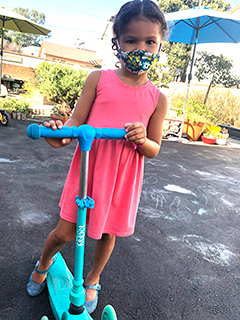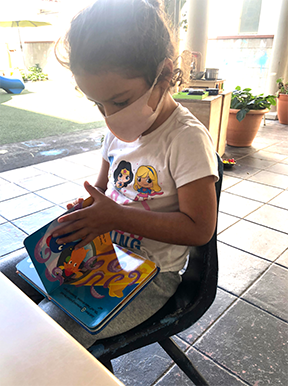PRESCHOOL IN THE TIME OF COVID-19
- Details
- Category: Community News
- Published on Monday, 19 October 2020 00:25
- Written by BRITTIE CRAWFORD, World City Center Preschool
 Deciding to send a child to preschool has always been a daunting task and finding the right childcare environment can sometimes prove challenging.
Deciding to send a child to preschool has always been a daunting task and finding the right childcare environment can sometimes prove challenging.Some of the things parents consider when selecting a preschool may include cost, distance to home or work, diversity, and play-based vs. academic. On top of that, navigating the plethora of educational philosophies can be a full-time job. Today, you can add COVID-19 to that mix, and you've got one mind-numbing task on your hands. Luckily, you can look for some things that can help make your search for the right preschool, during this time of uncertainty, more palatable.
Here are 10 things to look for when searching for a preschool in the era of COVID-19.
1. COVID-19 Emergency or Readiness Plan.
Every school needs to have a plan of how they will help to prevent the spread of Covid-19 in their school and how they will handle things if a case of Covid-19 shows up at the school or in the school community. The plan will need to outline wellness and temperature checks, cleaning strategies, social distancing, mask-wearing rules, drop-off and pick-up standards.
2. Bringing the Outdoors In.
Being outdoors is better than being locked inside a room with stagnant air. Many preschools have a strategy of bringing the outdoors in and leaving exterior doors or windows open, where possible, throughout the day. Check to see if your preschool plans to bring the outdoor air into their classrooms before children arrive.
 3. Cleaning Strategies.
3. Cleaning Strategies. As a state-licensed facility, preschools already have a cleaning strategy. Your prospective preschool's policy should include cleaning high-touch areas at least once per day. Still, many preschools opt for several cleanings throughout the day. Find out how often your prospective preschool cleans high-touch areas.
4. Ratios.
Ratios are essential right now, and lower numbers have helped in the preschool classroom by limiting the number of children and staff members in a space. State licensing agencies have mandated student-teacher ratios for preschools from 1:12 down to 1:10 while Covid-19 is still among us. Find out how many children will be in your child's classroom and with how many teachers.
5. Outdoor Time.
Although there is still debate about the disease and its spread, we hear that outside is better. Most preschools are ensuring that children have ample time outside. Find out what percentage of the day your child will be outside.
6. Temperature and Wellness Checks.
One of the biggest concerns for children returning to preschool is that they may be asymptomatic carriers and may be able to spread the virus with no symptoms. One way preschools combat this unknown is by administering temperature checks at drop-off and conducting wellness checks throughout the day.
7. Sick Time for Teachers.
Preschools understand that teachers may become ill and have told their teachers that they should stay home if they are sick. Find out what your preschool's sick policy is for their teachers and what they will do for substitutes if the teacher becomes ill.
 8. Travel Restrictions.
8. Travel Restrictions.At most preschools, family or staff travel, internationally or domestically, will require families to self-isolate for 14 days before returning to school or work. Check to see what the school's travel policy is.
9. Sick Child Policies for Kids.
As with teachers, it is inevitable that children will have an illness at preschool, Covid-19, or not. Most preschools already have in place a policy for when a child becomes sick at preschool. It usually involves the child being picked up by a parent within the hour. With Covid-19, many preschools have moved the pickup time to within 30 minutes. Children must stay at home for 72 hours if they have any Covid-19 like symptoms and return to school after there is no fever present for 24 hours without fever-reducing medication.
10. Handling Covid-19 cases in preschool.
If children test positive for Covid-19, preschools should contact all staff and parents in the community to let them know that there is a case of Covid-19. The preschool will then do a thorough cleaning of the child's areas within 24 hours, and that child must quarantine at home for 14 days.
Preschools in Los Angeles are all regulated by Community Care Licensing, a division of the California Department of Social Services, and Covid-19 regulations and mandates come from this agency. Many preschools have a few more policies that they've put in place, above and beyond licensing requirements, that they feel are best for their community. If your prospective preschool has a Covid-19 Emergency or Readiness plan, that is a good indication that they are prepared to handle the challenges we are facing when it comes to Covid-19 and preschoolers.
Lastly, it's essential to know that many studies show that nationally preschools haven’t had high rates of Covid-19 incidences and, according to childcare center data collected by economist and Brown University professor Emily Oster, childcare centers don't appear to be especially susceptible to infections. Many preschools in New Jersey remained open during early state closures and the YMCA recently reported that their centers that service 40,000 children had no outbreaks of Covid-19. These statistics and awareness of appropriate policies and well-thought-out precautions should give parents a little peace of mind when sending their children back to preschool.
News Category
-
Community News
In The CD 10 Race, Only One Candidate Has Earned The Right To Lead The District
 reprinted from CityWatch LA October 07 2024ELECTION 2024 - When you know the story of how Heather...
reprinted from CityWatch LA October 07 2024ELECTION 2024 - When you know the story of how Heather...
-
Neighborhood Councils
NEIGHBORHOOD COUNCIL UPDATE
Local Neighborhood Councils are a proactive way to become involved in your relationship with the...
-
City News
Communities Preparing for Disaster
 by Bob Gelfand CitywatchLAGELFAND’S WORLD - In a week of sometimes depressing news, I would like...
by Bob Gelfand CitywatchLAGELFAND’S WORLD - In a week of sometimes depressing news, I would like...
-
Crime Reports
HOW TO TELL IF YOU ARE THE TARGET OF A PHONE SCAM
 Every year, thousands of people lose money to telephone scams — from a few dollars to their life...
Every year, thousands of people lose money to telephone scams — from a few dollars to their life...
-
Local Development
WHAT IS DESTINATION: PICO AND WHY IS IT DOING ALL THOSE NICE THINGS ON PICO?
 Destination: Pico is a community nonprofit working to make Pico Boulevard more walkable, vibrant,...
Destination: Pico is a community nonprofit working to make Pico Boulevard more walkable, vibrant,...
Today6
Yesterday10
Week26
Month203
All988821
Kubik-Rubik Joomla! Extensions
Yesterday10
Week26
Month203
All988821
Currently are 116 guests and no members online
Kubik-Rubik Joomla! Extensions



